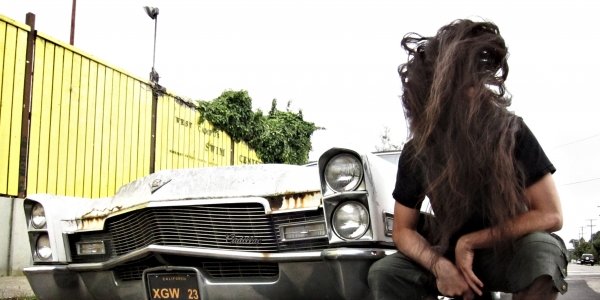Ashton’s musical beginnings lie in his teenage years spent listening to a colourful spectrum of music, which has certainly shaped the way in which he creates music today, as he explains. “I was obsessed with black metal and death metal back in the early ‘90s, and of course early rave music, and all the subsequent micro-genres of techno, electro, trip hop, jungle, and so on,” he lists. “I think every human is a reflection of their influences, so of course there is a very heavy, thick, fierceness to my sound which was affected by death metal, gangster rap, and punk rock.”
These influences are some of the things that characterise his musical output – not dissimilar to the crossover success of other artists with similar backgrounds to him, such as Pendulum or Skrillex, and I ask him for his thoughts on the influence of rock and metal creeping into dubstep and EDM. “I don’t think it is anything new,” he points out. “I remember when I was obsessed with psychedelic trance back in 1997 and all the producers had a background in metal or industrial. It’s the same thing with the early drum and bass scene. Those two are great examples of top-notch producers with a background in heavier forms of rock and metal.”
I’m curious as to whether this attempt to push his take on dance music into less traditional territory is a deliberate exercise in pushing boundaries in order to keep his music sounding as fresh and engaging as it does, or just a natural evolution, and Ashton points to both. “I experiment, of course, but really I just like to let go and allow the sickest, grooviest, most emotionally honest sound emerge,” he says. “The word ‘experimentation’ implies some specific intention, and I prefer a more freestyle approach than just experimenting. But yes, you hit the nail on the head. The goal is to create something wild in terms of style, tempo, everything. That’s a great summary.”
And with the extensive back catalogue of releases to his name, including almost an album per year to his name since 2001 all snapped up readily by fellow DJs and clubbers, the ease with which Ashton manages to push out releases with such a consistent level of quality is one many would envy. “I am consumed with a need to reflect creativity and productivity, it is just a natural impulse. I work nonstop, 24-7. I also work with a lot of other people (including a full-time dedicated studio in California and tons of collaborators) because I see all aspects of my life as a team effort. It is more fun that way.”
Asked about other artists within the scene he admires, his answer is unsurprising given the little free time he has. “I am pretty buried in Bassnectar, so I don’t get to explore other shows much,” he says apologetically. “Musically, I like bits of everything, but what really drives me wild is blending things together; mixing up scenes, mixing up sounds, mixing up styles. That seems to be how new ideas emerge: refining what exists and blending it with other things.”
Not only notorious for his work as a producer, his track record as curator of various music festivals, including the huge Bass Centre in North Carolina is similarly gleaming – previous rosters have included the likes of Dan Deacon, Brother Ali Ott, Nosaj Thing and more. Ashton describes it as another project he finds extreme amounts of satisfaction from working on.
“It is less about the lineup or the lights and lasers, and more about a big group experiment,” he replies. “That’s really my favourite part of this whole thing: bringing people together, and stimulating their nervous systems. Letting everyone kind of merge into one massive, churning mega-organism.”
I’m curious as to what extent his work behind the scenes to curate events like those differs to his work as a producer or DJ, and he explains them as being disparate, but similarly fulfilling tasks. “I am 100 percent addicted to both, and they are very different jobs. One is event-creator, the other is music creator. Then there is performer, and there is a bit of businessman in there too. But one of the most important jobs for me is giving back: making a positive social impact in the lives of other humans. Not out of political leanings, but just out of a fascination for human culture, and an unstoppable appreciation for how magical life really is.”
Sounds like a nice kinda guy, right? It doesn’t stop there – a lesser-known fact about Bassnectar is his support of non-profit organisation Conscious Alliance, whose aim is to raise money for the distribution of much-needed food to impoverished communities across the US with a focus on art and music-related events. “The whole Bassnectar team is dedicated to giving back – we all feel really lucky to be here. We collect $1 for every ticket sold (last year that was almost 250,000!) and let the fanbase decide how to spend it, on various charities or community organizations that promote strong communities, and healthier lives for individuals. Conscious Alliance is one of those organisations. So is Reachout, who started in Australia, actually!”
Speaking of Australia, Ashton’s last excursion down here was alongside the likes of Digital Mystikz, State of Mind, Triage and Consequence – now that’s one seriously heavy-duty lineup. I ask whether he had fun the last time he was down here, and the enthusiasm of his response bodes well for the upcoming Melbourne gigs. “Hell yes! It was incredible,” he says. “What was really fun for me is that all the shows were sold out but the venues were small – like, you could touch the ceiling, and all the humans could not even fit inside the room. Impossibly hot, and totally off the hook.”
I wrap up our interview by asking what he has planned for 2012, and he offers the very simple answer of: “va-va voom.” Sounds promising, hey?

